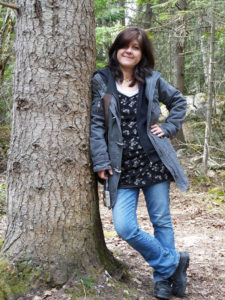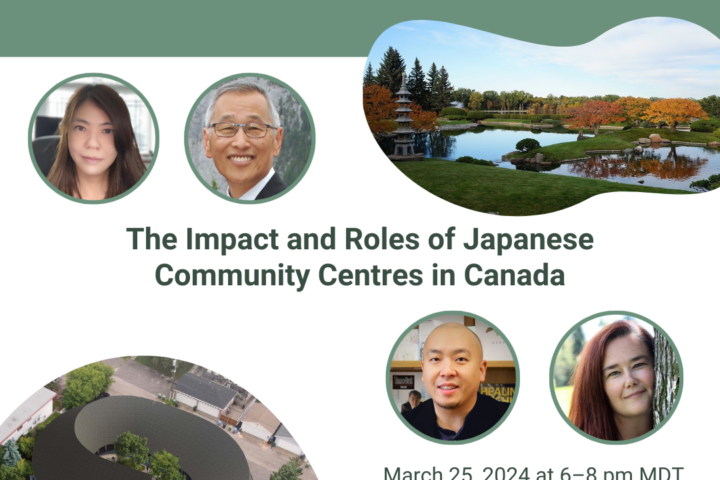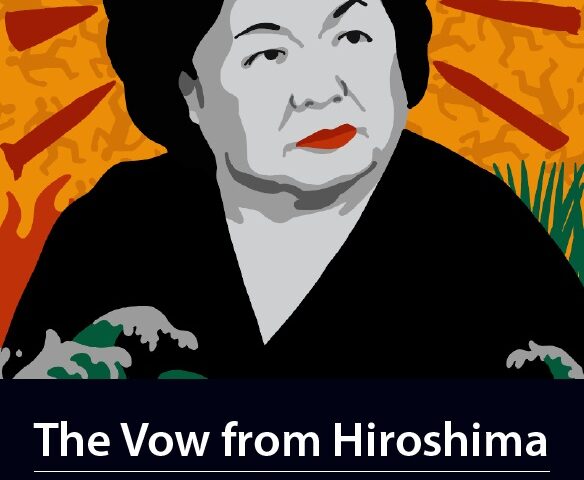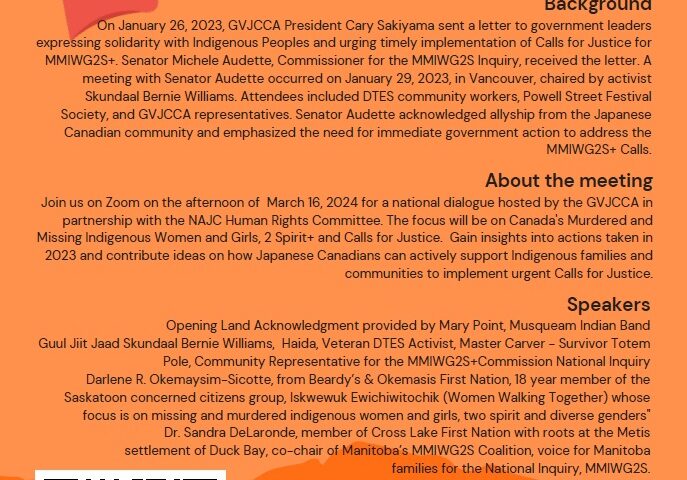 The National Association of Japanese Canadians (NAJC) has been checking in with some members of the Japanese Canadian community during this time when we’ve been social distancing and trying to stay home as much as possible. We’ll share some of our conversations in our e-news and social media.
The National Association of Japanese Canadians (NAJC) has been checking in with some members of the Japanese Canadian community during this time when we’ve been social distancing and trying to stay home as much as possible. We’ll share some of our conversations in our e-news and social media.
We caught up with author R.M. Greenaway who has released her latest book, River of Lies, the fifth book in her B.C. Blues crime series.
NAJC: We’ve all been affected by the shutdown because of the COVID-19 pandemic and even though a restart is happening in BC with the gradual re-opening, we are still not travelling far and following safety protocols. How have you been dealing with the pandemic and has it affected your writing?
RM: I am doing well in the slowdown, actually. I was financially okay, so was happy to lose the day-job for a month or so, giving me the chance to focus on the here and now. There is of course a lot of fear and uncertainty in the upheaval of the pandemic, but I think it’s also clarified for many people what matters and what doesn’t so much. I know it has for me.
The effect on my writing was a real gift, though. As my publisher coped with the shockwaves of the pandemic, they extended the final submission deadline of my sixth book by several months. Which meant I got to edit much more thoroughly, which means the end result will be worlds better than the version I would have otherwise been forced to turn in.
I need deadlines, and I appreciate deadlines, but I appreciate extended deadlines even more. I am never completely satisfied with the published end product, but at least this time I’ll be almost completely satisfied!
NAJC: What is at the top of your to-do list when all is safe again?
RM: I have a vague plan of taking a month to travel across the prairies with my son Nick, camping along the way, visiting the Badlands, and relatives, and Vulcan (my Trekkie son’s wish). I may get as far as Virden, Manitoba, where my father was born. If not, at least I want to see North Battleford, Saskatchewan, where one of my protagonists apparently grew up. I have an even more vague plan of setting a future novel there. Don’t ask me why! Maybe a prequel to my series, or a sequel, or some ill-conceived parallel universe fable with an entirely different set of characters. That’s the beauty of the road trip; it sparks ideas.
NAJC: Each of your books can be read as stand-alone novels, but I was very glad to start with your first book, Cold Girl. It introduced me to your RCMP investigators Leith and Dion who are featured in the crime series. They are complex characters who make me want to know more about them. Would you tell us about how the characters developed – and did the story of the murder come first or the characters?
RM: The story came first, and at first the characters were like actors who filled the roles, though now that I’ve come to know them so well, they don’t feel like actors at all.
How the first book came about was really just a doodle while riding the Greyhound to Prince Rupert from Smithers, where I was living and working at the time. I was homesick for Vancouver, and I think my blues coloured the setting and influenced the plot. Cold Girl was years in the making. I started writing it before the bleak phrase “Highway of Tears” became part of our vocabulary, but I saw the posters of young women gone missing, and though I was in no way attempting to write their stories, their faces set the novel’s melancholy mood.
Dion started off as a bit character working alongside my intended main protagonist, Staff-Sgt. Laura Gale. Gale disappeared on the second draft, which was I’m sure almost as badly written as the first, and the troubled and troublesome Constable Dion stepped into the lead role. Then his adversary/guardian angel Dave Leith came into being, and JD Temple has become my third main favourite person to write about. Writing female characters was always more challenging for me, but I was delighted to find that JD writes her own lines, and they must be good ones, as she’s gotten positive feedback from readers.
NAJC: Tell us about your latest book, River of Lies.
RM: I try to write what I like to read. When I read novels I find myself skimming the technical bits, and am never too concerned with plot devices or brilliant twist endings. As long as the characters are interesting, I glom onto the parts of the story that delve into human relationships, conflict, romance, misunderstandings. And crime fiction seems the perfect vehicle for all of the above.
However, though I focus on relationships in my own writing, I am happy to say the plot devices and twist endings kind of weave themselves in quite satisfactorily. When a reader comments that the plotting was clever, I can assure them it wasn’t my doing.
River of Lies was inspired by a short bit of testimony in a trial I once transcribed (I spent years as a court reporter) about a young man who took his own life. I originally wrote the novel around that sad vignette, and though the plot has since evolved along different lines, the atmosphere remains.
River of Lies takes place along the Seymour River in North Vancouver around Valentine’s Day, so romance figures prominently — as does rain — as the North Van RCMP investigate the bizarre kidnapping of a young child taken from her home in the midst of a dinner party. The intrigue of what actually happened to her interlaces with the personal lives of those searching for her. And of course, lies abound.
NAJC: In your acknowledgements for Cold Girl, you say, “If this story clicks with you, that’s what matters most.” It did click with me in a number of ways. One click was setting your story in BC and the descriptions of the locations resonated with me. Any plans for a story set in Nelson? Or outside of BC or Canada?
RM: I don’t think I’ll go too far abroad in my writing, or too close to home, either. But western Canada is such a universe, and I just wish I had another lifetime to explore it. Yes, I’ve actually got more vague plans – Vague Plan is my middle name — of setting a novel in the Cariboo. And/or the prairies. But before I do that, I’d have to go there, live there, and get to know the place as best I can. I don’t know how realistic that is at this point, though. Maybe the road trip I talked about earlier will have to do.
NAJC: Have you always written crime fiction? If you weren’t writing crime novels, what would you be writing?
RM: I’ve always liked reading crime novels, particularly series, like those of Ruth Rendell, Colin Dexter, Ed McBain. And then I worked in the court system, so writing crime was the path of least resistance for me.
I’d like to try something new, though the something new would still involve crime, I’m sure. Given time, a part of me would like to write a dystopian novel set in Northern BC in the near future. I have the thing plotted out in fact. I would also like to try a caper, along the lines of Donald E. Westlake’s Dortmunder novels.
Or a non-cop suspense, which I have a few plots in mind, since my work-in-progress, the sixth in the BC Blues series, Five Ways to Disappear, is pretty well done and out the door. Book six is also the end of my writing contract with Dundurn Press and the end to at least that part of the series, so I’m freed up to think outside the box, which is a little scary but also refreshing.
I also write short stories, and will likely try my hand at more. I have three published in anthologies so far. Does crime figure in those as well? Yes.
NAJC: Will you or have you already used your Japanese Canadian heritage in your writing?
RM: In the vaguely planned dystopian crime novel I’ve mentioned, one of my main characters is Japanese Canadian, which will be interesting for me.
When I was younger and starting to write my current series, I hadn’t put a lot of thought into my roots, Japanese on one side, Anglo-Celtic on the other, and so have not used heritage as a focal point in my books much either. I assign a range of ethnicities to characters, but only because diversity is interesting, and Canada is diverse.
Even now I’m not sure what my main character’s racial background is, and though it bothered me for a while that I couldn’t fill in the blank in my own head, I’ve decided that leaving it unfilled is fitting, since Dion’s heritage is largely a mystery even to himself. Maybe that’s a reflection of my own uncertainty.
NAJC: What/who is on your reading list?
RM: I’m sorry to say that I’m reading very little lately. Time was always an issue, and still is, even with the slow-down caused by the pandemic as I talked about earlier. Trying to put my messy life (house, garden, paperwork) in order seems to be a full-time job! Most nights I’ve taken to listening to podcasts about true crime, which is often stranger than fiction.
Among my reading list are some excellent local writer friends: J.G Toews and Roz Nay and Dave Butler. I listen to the classics, too, the Sherlock Holmes and the Agatha Christies. For years I had put off reading Christie, thinking her work is all about knitting needles and tea, but have recently found it’s not so at all. I also like Ann Cleeves’ Vera and Shetland series, and will be reading more when I get the time.
NAJC: Answer the question that you wish someone would ask you.
RM: To what three key words do you attribute your success?
Serendipity: I had given up all thoughts of getting published when I chanced upon an event at the Nelson library – Holley Rubinsky launching South of Elfrida. I liked her and her work so much that when I saw that she and crime writer Deryn Collier were putting on a writing workshop, I got on board. It was the first time I’d gotten feedback and mentoring, and the generous help and encouragement I received from those two with Cold Girl was key to it winning a major contest, which then led to publication.
Music: When I’m feeling flat, writing-wise, music inspires me and lends continuity to the story’s geography. I can thank my brother John for pointing me to what have become my favourite musicians and tunes. I would be so much poorer without them.
Perseverance: I’m embarrassed to admit how many years it took to get published, and how many tears I’ve shed when rejected. But if you’re in the same boat as me, know that if you love writing for writing itself, and keep at it, you will improve, which is success in itself. And goofy as it sounds, love is the key!
NAJC: Thanks for taking the time to chat with us and letting members of the Japanese Canadian community know what you’re up to.
RM: Thank you for inviting me to this interview! The questions were challenging and fun to answer.
R.M. Greenaway
RM began writing crime fiction in a blizzard. She was on a Greyhound bus, travelling northbound from Smithers to Prince Rupert, on the job as a court reporter covering the northern half of B.C. Street names became character names as the bus passed through towns and villages, and the blizzard became the setting for her first book. Cold Girl won the 2014 Arthur Ellis Award for best unpublished novel, which led to her ongoing B.C. Blues Crime series, published by Dundurn Press. Fifth in the series, River of Lies, was released in March 2020 in the midst of a pandemic. Three of her short stories have been pubished in anthologies: Keene Hill, The Threshold, and Rozotica. If you’d like to know more or get in touch, drop by www.rmgreenaway.com. She’d love to hear from you!



